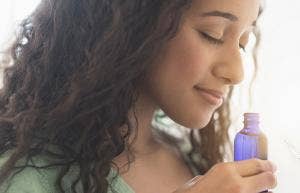Essential oils have become extremely popular over the last few years, with a lot of people getting more into natural alternatives for beauty and healthcare. But essential oils can be used for a LOT more things besides just putting a few drops in your bathwater.
In fact, essential oils have hundreds of uses that range anywhere from beauty and skin care to alternative cleaning supplies and even wound care.
So, if you absolutely love busting out your diffuser when you've had a stressful day, buuuut you want to get more out of just using essential oils for one thing, then look no further because this is going to be your go-to guide to get you obsessed with essential oils.
Of course, I know you're probably thinking that you're not just going to go out and buy ten bottles of essential oils without knowing all the facts, and I agree.
Buying essential oils isn't just like buying perfume - it's a much more complex process that is going to be different for everyone.
RELATED: 25 Ways To Use Lavender & Lavender Oil
Looking for soft skin? Want a disinfectant spray that's a lot safer on your furniture and for your family?
If yes, then essential oils are going to become your new best friends because they do it all.
But don't be put off if you've already tried essential oils and feel like they just don't do the trick for you — some will work and some won't, especially when it comes to how your body reacts to certain ingredients.
But I swear by essential oils and have swapped most things I use on my skin and in my hair that are jam-packed with chemicals in favor of essential oils - and it DOES make a difference.
But before we can get into all of that, let's start with the basics.
What are essential oils?
Essential oils are essentially concentrated oils found in all parts of plants, including the petals, leaves, stems, roots, and more. They are extracted from plants and bottled without any added ingredients - meaning they are 100 percent pure. Essential oils are very quickly absorbed into the skin and won't leave any oily residue behind, either. So, while they are a kind of oil, it's nothing like olive oil or something similar in consistency that would leave your skin feeling greasy afterwards.
Before essential oils are extracted from plants, they are basically the plants natural protection from insects, decay, and other environmental threats. They are also what give plants the smell you associate with that plant.
For example, rubbing the leaves of a basil plant will make it smell like basil; smelling roses or lavender does the same. All of that? That's what helps create essential oils.
When essential oils are creating, they are often distilled through water or steam, which basically means - if you want to get as primitive about it as possible - that they are cooked together until the plant turns to oil and then the rest of the plant is separated from the oil that's eventually bottled and sold.
Let me just say that I have tried to make my own essential oils before and it turned out terribly because I was only about to make about a quarter of an ounce with the plants I bought. So, even though essential oils can be expensive, remember that the process is NOT easy and requires a lot of plants to get enough oil to fill those tiny, one-ounce bottles.
RELATED: Study Says This Really Weird Thing Is Causing Your Depression
Beginner's guide to using essential oils:
Essential oils are VERY concentrated (AKA strong), so don't let those tiny little bottles trick you. When you are ready to use essential oils, it's important that you dilute them with a carrier oil because chances are pretty good that you won't react kindly to having pure essential oil applied directly to your skin.
There are a few essential oils - like tea tree - that aren't as strong, but it's still always safe to mix them with another oil to be safe. Some of my favorite carrier oils (and some of the best for amazing, glowy skin) are sweet almond, vitamin E, coconut, and jojoba oils.
If this is the first time using essential oils, start with one or two drops of essential oil for every teaspoon of carrier oil. If this ain't your first rodeo, you can do whatever amount of essential oil you're comfortable with but remember that even a seasoned essential-oil user can get a bad reaction. This is especially true for essential oils that can affect children and pregnant women negatively, so before buying and using an essential oil, always read the application uses and potential safety precautions first.
RELATED: 7 Foods That Turn Your Body Into A Cancer-Fighting Machine
Are essential oils safe?
Yes! Essential oils are the bomb and they can be very safe. But not all essential oils are meant for human topical (directly on the skin) use or even ingestible.
You probably already know that oils like lemon, chamomile, and basil are safe to ingest because you've had variations of these plants in food at one point or another, but some aren't meant for consumption at all because they can be toxic to your system - and that includes ingesting it, as well as putting it into your diffuser and using the essential oil as an inhalant.
Like I said, the only way to know for sure which essential oils are meant for what is to do your research first. But don't let that scare you because more often than not, you won't even be able to find the essential oils that are harmful to your body in stores anyway.
RELATED: What's The Difference Between Vegan And Vegetarian Diets
Keywords: health, skincare, wellness, health and wellness, oil, essential oils, essential oil, oils
Source YourTango | The Latest Smart Talk About Love http://ift.tt/2CfoWz5
